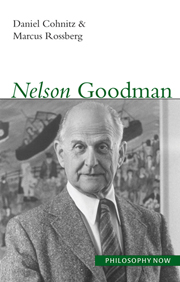Book contents
- Frontmatter
- Contents
- Acknowledgements
- Abbreviations
- 1 The worldmaker's universe
- 2 If this were an emerald it would be grue: problems and riddles of induction
- 3 The big picture
- 4 Particulars and parts
- 5 From Vienna Station to Boston Terminus
- 6 Follow the sign
- 7 Diagnosing art
- 8 Starmaking
- 9 Never mind mind, essence is not essential, and matter does not matter
- List of symbols
- Glossary of technical terms
- Further reading
- Notes
- Bibliography
- Index
9 - Never mind mind, essence is not essential, and matter does not matter
- Frontmatter
- Contents
- Acknowledgements
- Abbreviations
- 1 The worldmaker's universe
- 2 If this were an emerald it would be grue: problems and riddles of induction
- 3 The big picture
- 4 Particulars and parts
- 5 From Vienna Station to Boston Terminus
- 6 Follow the sign
- 7 Diagnosing art
- 8 Starmaking
- 9 Never mind mind, essence is not essential, and matter does not matter
- List of symbols
- Glossary of technical terms
- Further reading
- Notes
- Bibliography
- Index
Summary
In the preceding chapters our aim has been to introduce some of the main aspects of Nelson Goodman's philosophy. We have occasionally mentioned criticisms of Goodman's positions, when we thought that this was useful for a better understanding of his views. What we have tried to do is limit these critical remarks, however, so that they do not distract from the book's main line of argument, namely that Goodman's views on topics as diverse as induction and aesthetic expression are interrelated in interesting ways.
Now that we are approaching the end of the book, a little more should be said regarding the critical evaluation of Goodman's ideas, and we shall do so in sections devoted to specific branches of systematic philosophy: philosophy of science, metaphysics, logic and mereology. Inevitably, this is all rather eclectic. However, in the Further Reading we indicate books or papers in which more critical discussions of Goodman's work can be found, concerning, too, the topics not treated in this chapter.
None of the issues we raise in this chapter have been settled. They are all very much a matter of current philosophical debate in one way or other. We are not foolish enough to attempt to give a definitive answer to any of them, but rather hope that these open problems will spawn interest in further philosophical research and debate, be it in favour of, or against, Goodman's positions.
- Type
- Chapter
- Information
- Nelson Goodman , pp. 204 - 228Publisher: Acumen PublishingPrint publication year: 2006



